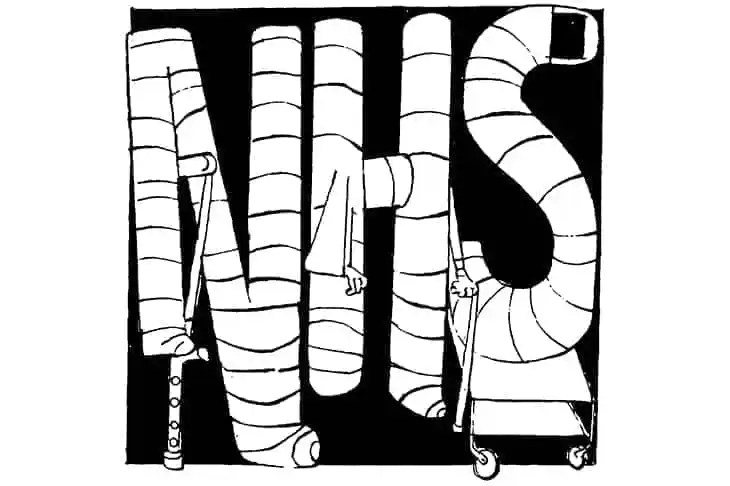The past few days have seen some welcome candour about the NHS in England and Scotland. English Health Secretary Steve Barclay has been preparing the English public for long waits that will still be a major issue at the next election. NHS Scotland, meanwhile, has been discussing the possibility that a ‘two-tier NHS’ might end up being the norm.
Barclay is also keen to scrap as many targets as possible in the health service, which is in part an admission that many of the most high profile ones haven’t been met for years. It is also a sign of an important shift in the treatment of the health service by the top brass.
Barclay did his pitch-rolling on waiting lists and targets in the Sunday morning broadcast round. It’s been reported in some quarters as the end of the ‘pen-pushers’ in the NHS, with Barclay and Chancellor Jeremy Hunt looking to cut budgets and staff at central NHS England by as much as 50 per cent. It is always worth pointing out that our health service is comparatively undermanaged – much of the national bureaucracy would have to be replicated at a local level for hospitals and wards to be able to function.
The problem Barclay was highlighting with targets was not that there was some monstrous regiment of managers with clipboards, but that the targets themselves skew the priorities of NHS trusts and lead to gaming of the system. ‘There is a place for targets, but if everything is a priority then nothing is a priority and this in my view is best assessed [locally].’
It isn’t a surprise he is taking this attitude given Hunt was branding targets ‘evil’ just days before he relinquished his role as chair of the Health and Social Care Select Committee and re-entered government. It is also not surprising that Barclay was keen to talk about the NHS being under ‘severe pressure’ and the likelihood of it returning to normal any time soon being very slim.
What no minister can admit, is that the principle of the NHS that Brits hold so dear is already being eroded informally
The stories of long ambulance waits, people dying before they are seen, or stuck in hospital when they’re fit for discharge are now almost unremarkable because they are so common. But with waiting lists for elective care so high, everyone will either be on or know someone who is waiting for treatment.
That’s not something voters tend to price in at an election. So ministers need to work out a way of acknowledging that and getting some kind of handle on the narrative, rather than appearing totally out of their depth.
What no minister, whether in England or Scotland, can admit, is that the principle of the NHS that Brits hold so dear is already being eroded informally. Scottish Health Secretary Humza Yousaf has insisted that the ‘founding principles’ of a free NHS must be maintained after leaked minutes of an NHS Scotland meeting showed there had been discussions of the potential to ‘design in a two-tier system where the people who can afford to, go private’.
Those papers pointed out that people are already doing this – they are, in increasing numbers, in the health services in all four nations of the UK. The suggestion here seems to be that this might be formalised. The chances of a formal shift happening are close to zero. But what ministers don’t really want to talk about is that point made by officials in those confidential documents that a two-tier system exists already.
Back in the 1980s, Margaret Thatcher and a number of her ministers saw having private healthcare as a badge of honour. They boasted that it was a way of leaving more space in the free health service for those who couldn’t afford to pay. That kind of argument was controversial then and it is not something any minister – even those who do use private care for themselves and their families – would make now.
But the two-tier system has always been there, particularly for mental illness, where the NHS hasn’t ever really existed in a meaningful sense for many patients. It’s just that now waiting lists and outcomes are deteriorating for physical conditions too, people are noticing.
The political problem with the Thatcher argument is that if a sufficiently large proportion of the population takes out private healthcare insurance, they will then question paying for a health service they don’t believe in any more through general taxation. Currently, the majority of the increase in people going private is in the ‘self-pay’ sector, whereby someone pays up front rather than from an existing insurance scheme. That has its own problems for private healthcare companies.
But if patients decide to start paying for regular insurance too, then they are turning away from the principle of the health service. Perhaps initially the politicians will get the blame for that, which is why Barclay and Yousaf have been so busy trying to prepare people for long waits. But whoever is in power in the next few years is going to have to work out how to deal with the potential for falling public support for an NHS.
There may be a party with the stomach that Thatcher never really had for scrapping the service and going for something else. But chances are that in its absence there is going to need to be a much more meaningful debate about reforming the health service and its interlinked sectors, including social care, than anything we are getting at the moment.







Comments